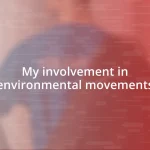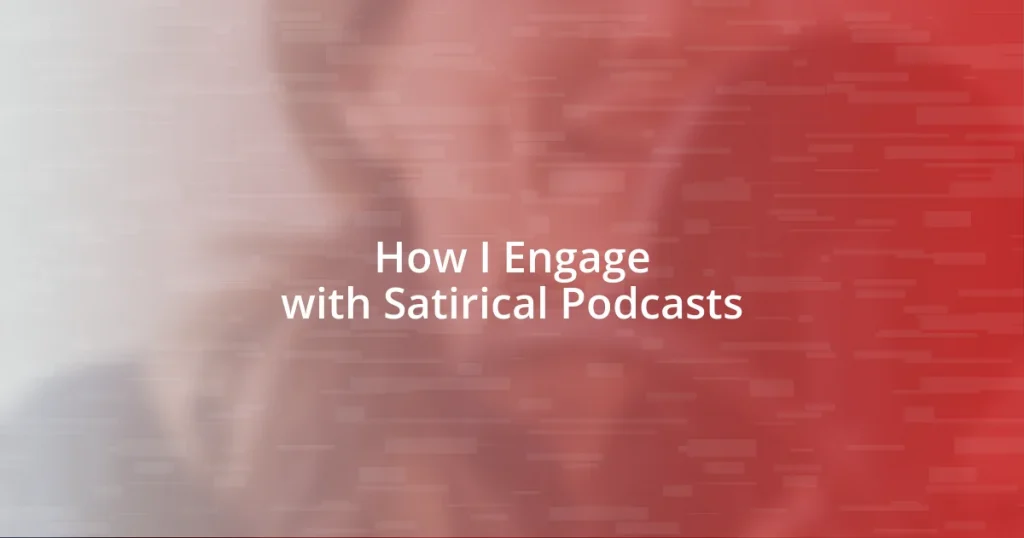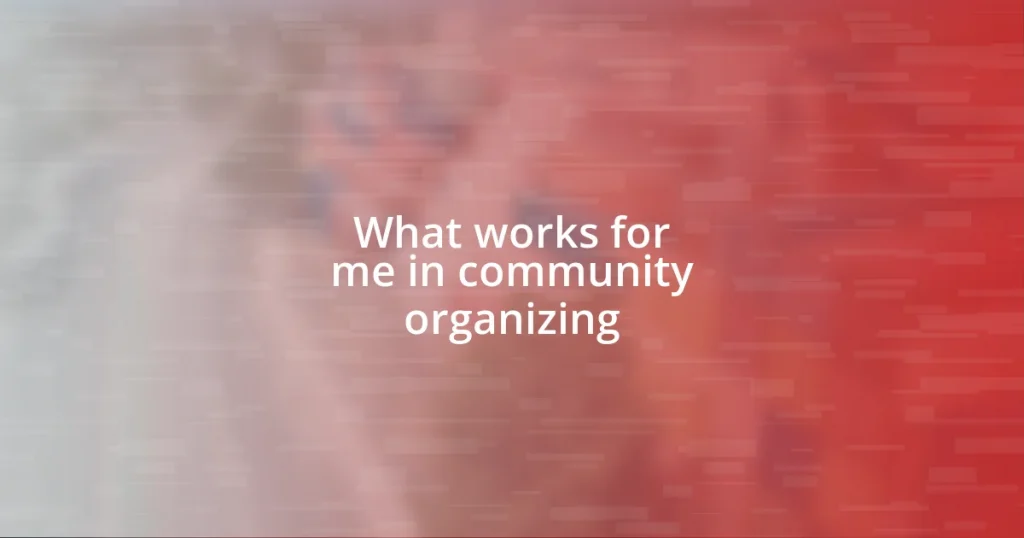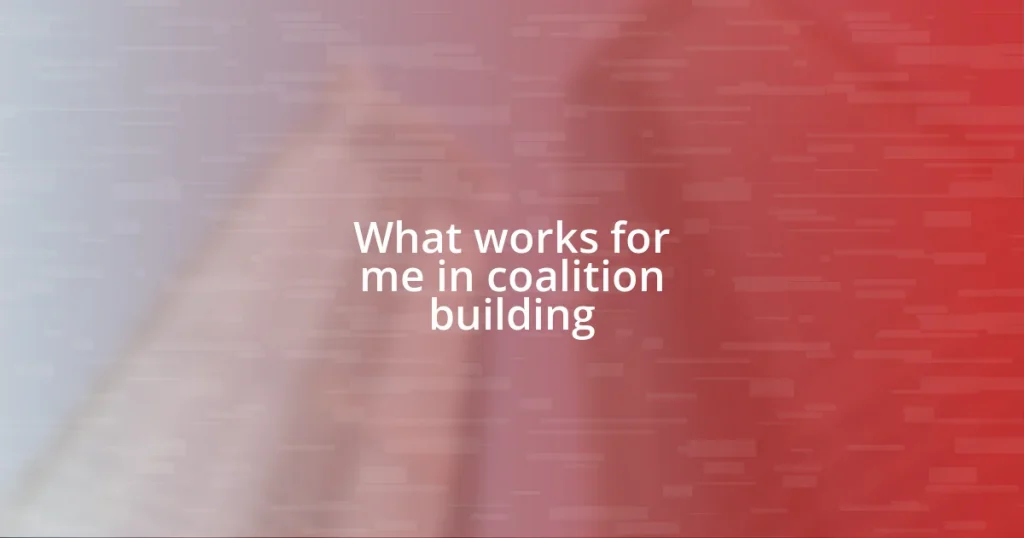Key takeaways:
- Satirical podcasts combine humor and critique, offering engaging commentary on societal issues while encouraging reflection through laughter.
- Choosing podcasts involves considering hosts’ backgrounds, formats, and audience connection for a more fulfilling listening experience.
- Sharing insights from podcasts can spark meaningful discussions and foster community among listeners, making satire a powerful tool for dialogue.
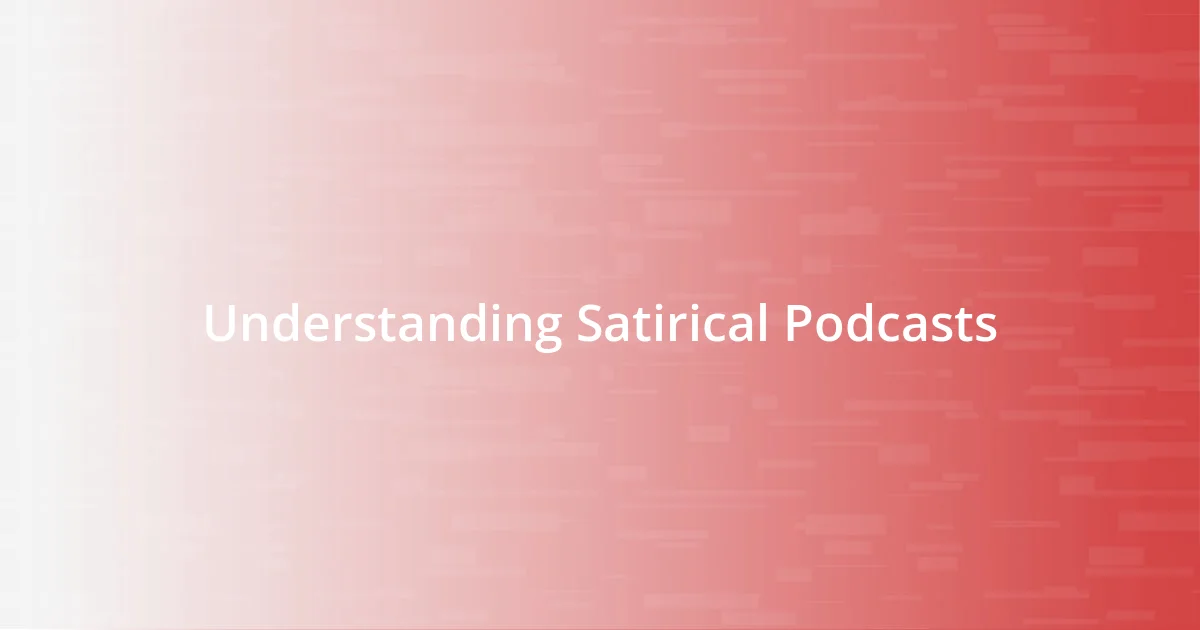
Understanding Satirical Podcasts
Satirical podcasts are a unique blend of humor and critique, where hosts use wit to shine a light on societal issues. I remember the first time I stumbled upon a satirical podcast; it felt like a breath of fresh air. The way they tackled politics with laughter made me question why we often take ourselves too seriously in serious discussions.
What I find fascinating is how these shows often reflect current events and cultural shifts, provoking thought while keeping us entertained. It’s as if they hold a mirror up to society, making us laugh at our absurdities. Have you ever listened to a podcast that made you chuckle yet ponder? For me, it’s a delightful paradox that makes the messages even more impactful.
Moreover, the format of satirical podcasts encourages a more engaging listening experience. The back-and-forth banter among hosts creates an intimate environment, almost like eavesdropping on your friends’ lively discussion. I often feel a sense of camaraderie with the hosts, driving home the realization that I’m not alone in my views or frustrations about the world. It’s like finding a community that shares my sense of humor while exploring serious topics.
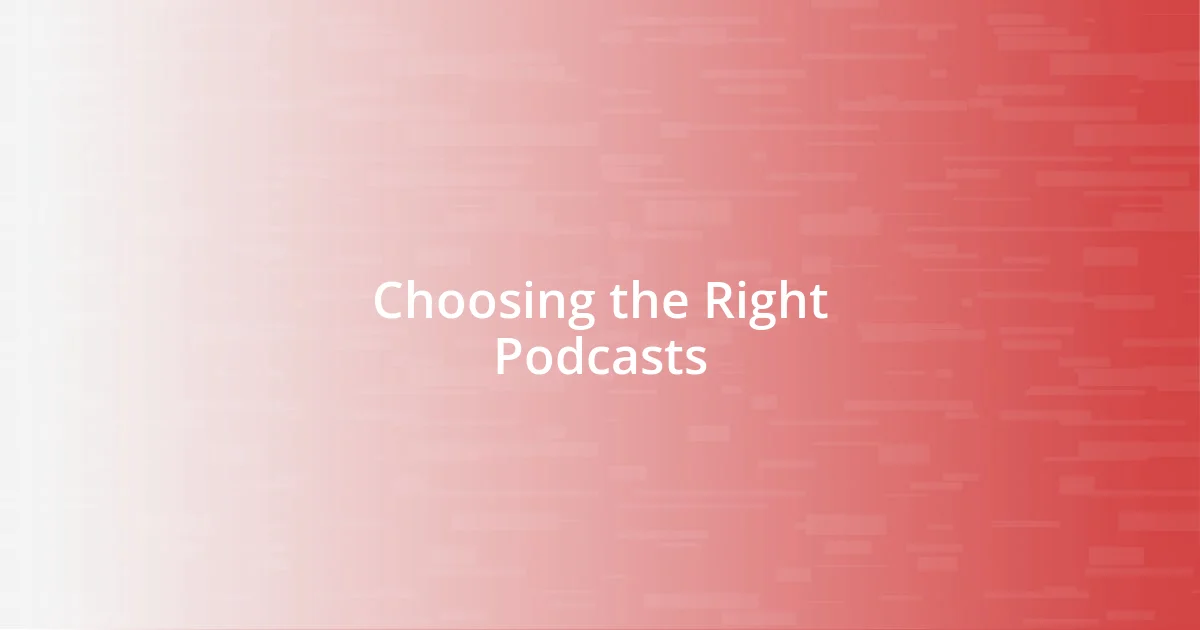
Choosing the Right Podcasts
When it comes to choosing the right satirical podcasts, I recommend considering the hosts’ backgrounds and perspectives. Some creators have journalistic experience, while others come from comedy or entertainment sectors. For instance, I prefer podcasts where the hosts blend humor with insightful commentary, as they often provide a more nuanced view of current events.
Another crucial factor is the podcast’s format. Do you enjoy long, in-depth discussions, or do you prefer concise, punchy episodes? Personally, I find that bite-sized episodes, around 15-20 minutes, fit well into my daily routine and keep me engaged. This way, I can enjoy indulging in satire during my morning commute without feeling overwhelmed by lengthy discussions.
Finally, don’t underestimate the importance of audience connection. Listening to podcasts that resonate with my beliefs and values enhances my enjoyment. I remember feeling particularly drawn to a show that discussed cultural issues similar to my own experiences, which made the humor hit even harder. Finding a podcast that aligns with your interests and experiences can make the experience all the more rewarding.
| Criterion | Personal Preference |
|---|---|
| Hosts’ Backgrounds | Journalists for nuanced commentary |
| Podcast Format | Bite-sized episodes for daily engagement |
| Audience Connection | Resonance with personal beliefs for deeper enjoyment |

Exploring Podcast Formats
Exploring different podcast formats truly enhances the listening experience. I often find myself gravitating toward episodic shows where each installment builds on the last, creating a deeper narrative structure. For example, one series I followed delved into political satire in a sequential manner, allowing me to witness how humor evolved in sync with real-world events. I felt this sense of anticipation for each episode, as if they were crafting a live performance.
Here are some key podcast formats you might encounter:
- Interview Style: Hosts engage in conversations with guests, often providing varied perspectives.
- Panel Discussions: Multiple hosts discuss topics, encouraging lively debates and diverse opinions.
- Narrative Episodes: These are crafted like stories, with scripting and sound design enhancing the satirical elements.
- Short Clips: Perfect for quick listens, these formats often distill humor into bite-sized insights.
Recognizing the nuances in these formats can shape how you engage with the content. Just recently, I discovered a narrative-style podcast that creatively wove current events with absurd fictional scenarios. It transported me to a different world, showing the power of storytelling in satire, making complex issues more relatable and accessible.

Engaging with Podcast Content
Engaging with podcast content often feels like diving into a conversation over coffee with a friend. I remember one particular instance where I tuned into a satirical podcast that tackled the absurdities of everyday life. The hosts’ playful banter made the whole experience feel intimate, as if we were all in on the joke together. It got me wondering, have you ever listened to a podcast that made you chuckle out loud while doing mundane tasks?
When I immerse myself in provocative content, I find it crucial to actively listen. I try to pause and reflect on what’s being said, especially when the satire makes a sharp point about society. For example, during one episode that scrutinized political rhetoric through a humorous lens, I had to pause and jot down my thoughts. That moment of reflection not only deepened my understanding but also sparked my own ideas about the topics discussed. Can you imagine how much more impactful it is to engage with content on that level?
I also love to discuss episodes with friends or even share them on social media. There’s something energizing about finding a quote that resonates and sharing it with others. It turns solitary listening into a community experience. I recall blasting a particular episode with a clever take on current events, and it ignited a lively debate among my friends afterward. Engaging with podcast content, for me, isn’t just passive listening—it’s an invitation to connect, reflect, and share insights with others.

Sharing Insights with Others
Sharing insights from satirical podcasts offers an opportunity to broaden perspectives through meaningful discussions. I vividly remember a time when I shared a particularly thought-provoking episode with my family during dinner. The witty commentary on social media culture sparked a lively debate at the table, revealing how we all interpreted the humor and underlying messages differently. It made me realize that satire is not just entertainment; it’s a launchpad for deeper conversations.
I often find that sharing specific snippets or quotes from these podcasts can lead to eye-opening discussions. Just last week, I sent a friend a clip that cleverly criticized consumerism. It ignited a fascinating conversation about our own purchasing habits and societal pressures. This interaction highlighted how sharing insights can foster connections based on mutual understanding, prompting us to reflect on our own lives in relation to the humor we consume.
One thing I’ve noticed is how sharing insights can create a ripple effect. When I post about a podcast episode that made a lasting impression, I receive messages from others, sharing their thoughts or even recommending related content. This exchange feels like we’re all part of a larger dialogue, connecting through laughter and shared insight. Have you ever discovered a new perspective simply by discussing something you heard? It’s amazing how a single episode can resonate differently with each person, fostering a vibrant community around these humorous narratives.

Analyzing Humor Techniques
When analyzing humor techniques in satirical podcasts, I often focus on the use of exaggeration. One episode I listened to took a common workplace scenario and blew it entirely out of proportion, turning a mundane meeting into an absurd circus. This hyperbole not only made me laugh but also highlighted the ridiculousness of everyday office life. Can you think of a time when a podcast turned a familiar situation into something hilariously outrageous?
Another technique I appreciate is irony, especially when the hosts juxtapose expected outcomes with surprising twists. I was particularly struck by a segment discussing modern dating apps, where the comedic take on profiles veered into unexpected territory. The contrast between real-life awkwardness and how people portray themselves online struck a chord with me. It made me reflect—how often do we present a curated version of ourselves, even in casual settings?
Finally, wordplay is a fun technique that I find adds an extra layer of enjoyment. There was a podcast episode that cleverly played with language while riffing on political slogans. The clever puns had me chuckling, but they also led me to think critically about the messages behind the phrases we hear every day. Do you find that plays on words resonate with you in ways that might lead to deeper reflection? It’s fascinating how humor can serve as both entertainment and a lens for examining important issues.
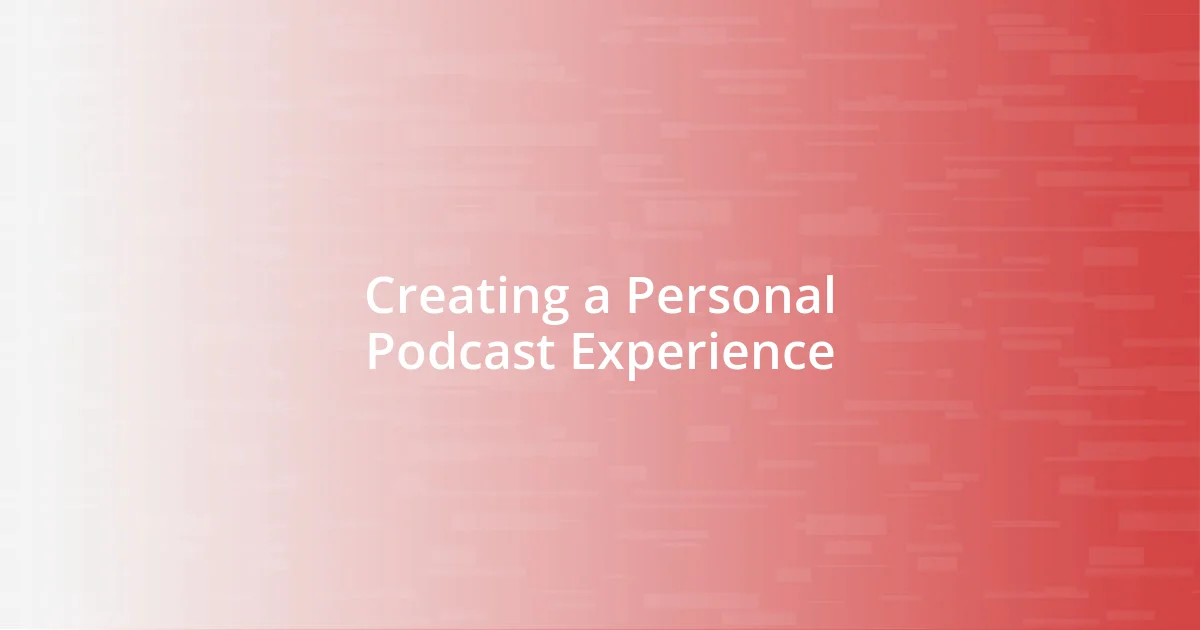
Creating a Personal Podcast Experience
Creating a personal podcast experience often hinges on how I tailor my listening habits to resonate deeper with my interests. For instance, I remember a time when I grabbed my favorite mug of coffee and nestled into my couch, ready to dive into an episode that aligned perfectly with my thoughts on politics. That moment transformed podcast listening into a ritual, making every episode feel like a personal conversation between me and the host. Have you ever felt that cozy connection with a specific podcast?
I find that engaging with content on a more personal level enriches my experience tremendously. I once chose to listen to a series that focused on mental health with my headphones in, completely immersed in the soothing cadence of the host’s voice. The topics discussed hit home, making me reflect on my experiences and encouraging me to jot down emotions as they surfaced. This process of self-reflection made the podcast experience feel even more intimate. How do you process your feelings while listening to a podcast?
Additionally, I like to create a dedicated space for listening, which has proven invaluable. I remember setting up a small corner in my room with soft lighting and my favorite plants surrounding me, transforming an ordinary activity into a sacred space for contemplation. This ambiance heightened my focus and enjoyment as I delved into discussions about societal issues. It’s incredible how an environment can elevate a simple podcast into a personal retreat, isn’t it?






